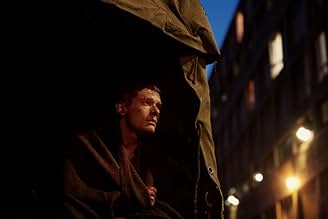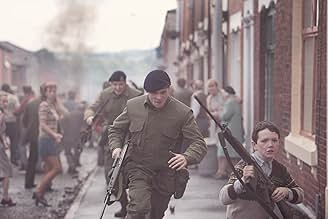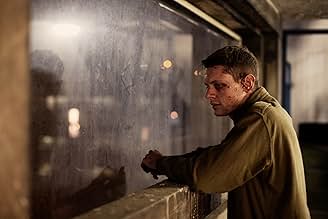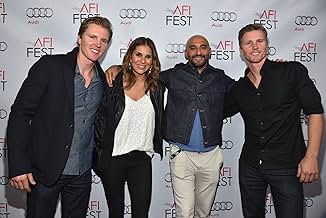1971 wird ein junger und desorientierter britischer Soldat von seiner Einheit nach einem Aufstand auf den tödlichen Straßen von Belfast versehentlich verlassen.1971 wird ein junger und desorientierter britischer Soldat von seiner Einheit nach einem Aufstand auf den tödlichen Straßen von Belfast versehentlich verlassen.1971 wird ein junger und desorientierter britischer Soldat von seiner Einheit nach einem Aufstand auf den tödlichen Straßen von Belfast versehentlich verlassen.
- Nominiert für 2 BAFTA Awards
- 14 Gewinne & 31 Nominierungen insgesamt
Empfohlene Bewertungen
I will be honest and say that I generally am touchy about films using the sectarian terrorist organizations, the troubles, or other aspects of Northern Irish politics as a base for thrillers or films – mainly because when they do, they do so in a rather heavy-handed and thoughtless way such as The Devil's Own, The Jackal, or many other such films. So with '71 there is a certain odd feeling that uses the streets of Belfast in the early 1970's as a launching point for a thriller involving British soldiers, terrorists on both sides of the divide, the RUC, and civilians of the time. This is not only an odd feeling that I had, but it is also one that the film itself seems to be all too aware of.
To talk generally the film does provide some good tension, with its fast pace, shifting ground, and hand-held camera-work; when it is doing this it is fine – not perfect, but fine. The sense of being trapped between all sides is apparent, and with the stakes high it does move well with what it does. The need to have all the players be clear and be positioned does rather reduce the pace a bit, but what does limit the film a bit is, ultimately, the politics of it. So, for some of this it is not the film that does this but rather the viewer – I guess particularly if you are familiar with the Troubles then it is hard to detach your personal opinions from the drama, which can make some of it harder to get into. The bigger thing though is that the film itself is conscious of this being a real situation, and as such it does know it carries a certain weight with it compared to if it had created this story in a fictional situation.
The cast carry this weight too, although mostly they do play out their characters as a more straightforward thriller – which helps the film be just that. O'Connell, Harris, Dormer, and others all play solid roles in the thriller side, even if the weight of the politics stop them just being genre devices, or being too details as real people. The pacing and structure of the film is good, and mostly it does manage to present the city streets of the Belfast roadblocks and no-go areas as oppressive and ensnaring if you are on the wrong side of them.
So as a thriller it mostly does work well thanks to the shifting narrative, and pace of delivery, however it is a film that senses the weight of the real story that it is using for the purposes of the thriller, and this knowledge does make a difference across the delivery.
To talk generally the film does provide some good tension, with its fast pace, shifting ground, and hand-held camera-work; when it is doing this it is fine – not perfect, but fine. The sense of being trapped between all sides is apparent, and with the stakes high it does move well with what it does. The need to have all the players be clear and be positioned does rather reduce the pace a bit, but what does limit the film a bit is, ultimately, the politics of it. So, for some of this it is not the film that does this but rather the viewer – I guess particularly if you are familiar with the Troubles then it is hard to detach your personal opinions from the drama, which can make some of it harder to get into. The bigger thing though is that the film itself is conscious of this being a real situation, and as such it does know it carries a certain weight with it compared to if it had created this story in a fictional situation.
The cast carry this weight too, although mostly they do play out their characters as a more straightforward thriller – which helps the film be just that. O'Connell, Harris, Dormer, and others all play solid roles in the thriller side, even if the weight of the politics stop them just being genre devices, or being too details as real people. The pacing and structure of the film is good, and mostly it does manage to present the city streets of the Belfast roadblocks and no-go areas as oppressive and ensnaring if you are on the wrong side of them.
So as a thriller it mostly does work well thanks to the shifting narrative, and pace of delivery, however it is a film that senses the weight of the real story that it is using for the purposes of the thriller, and this knowledge does make a difference across the delivery.
It took me a while to finally give this film a chance, but I actually do not regret watching it. It was enjoyable, had a great pace, and had enough unexpected twists and turns to keep you guessing. The movie was also full of characters who seemed weak but faced stressful situations that they did not look like handling, and that created a lot of tension in the movie. An element, as I always say, essential if you are to like a movie. Being a foreigner, I don't know if this is based on real events, but either way, I thought the movie was definitely better than the rating its given. I have seen a lot worse with ratings of 8 or above on IMDb.
Understanding the intricacies of the Troubles is by no means an easy task, but director Yann Demange has done an excellent job of presenting this conflict in '71. Demange made something of a name for himself on British television, directing the E4 horror series Dead Set and Channel 4 crime drama Top Boy, and this success has translated very well into a film with much larger political significance.
The characters of '71 are very much forged by their on-screen experience. Little backstory is given to the protagonist, Gary Hook, portrayed by Jack O'Connell, yet he gives a compelling physical and visual performance with an almost empty script. The intimate, personal atmosphere of the film makes the political conflict much easier to grasp for the viewer and the diversity of the opposing factions and characters shines through with an excellent supporting cast.
The only flaw I could find in the film is its difficulty in exploring the "why" behind the conflict we witness on our screens. This in itself may play into the story, however, as British soldiers expecting to be sent abroad found themselves much closer to home, in a conflict they themselves didn't fully understand.
The Troubles are a criminally under-taught and under-represented period so '71 offers an intriguing glimpse into the unrest and disorder that regrettably continues to this day.
The characters of '71 are very much forged by their on-screen experience. Little backstory is given to the protagonist, Gary Hook, portrayed by Jack O'Connell, yet he gives a compelling physical and visual performance with an almost empty script. The intimate, personal atmosphere of the film makes the political conflict much easier to grasp for the viewer and the diversity of the opposing factions and characters shines through with an excellent supporting cast.
The only flaw I could find in the film is its difficulty in exploring the "why" behind the conflict we witness on our screens. This in itself may play into the story, however, as British soldiers expecting to be sent abroad found themselves much closer to home, in a conflict they themselves didn't fully understand.
The Troubles are a criminally under-taught and under-represented period so '71 offers an intriguing glimpse into the unrest and disorder that regrettably continues to this day.
Tracking a young British soldier who fights for his life after being stranded by his unit on the vicious streets of Belfast, this 1971-set thriller is as grubby, tense and frenetic as the Northern Ireland conflict itself. Debutant Yann Demange does a sterling job in the director's chair, bringing a Paul Greengrass-esque urgency to the action with a combination of regular close-up shots and (not-too-shaky) hand-held camera work. Demange wisely opts for a quality over quantity approach to the brutal violence too, resulting in a few impactful events of savagery and gore that enhance the tension and dread rather than exploit it. Occurring over one night only, Demange – working from Gregory Burke's sparing, taut script – wrings suspense from moments as small as an uncomfortable conversation in a bar, and as big as a cat-and-mouse set piece in an apartment complex or the dazed aftermath of an explosion. It's not all smooth sailing though. The relatively unexplained bookending scenes are a tad cheesy and add little, whilst the bulk of the supporting characters are rarely more than stereotypes, albeit played with gusto. But this movie unmistakably belongs to lead actor, and recent BAFTA Rising Star winner, Jack O'Connell. His Private Gary Hook is resilient yet fragile, strong-willed yet frightened, making him a relatable everyman who will do anything to stay alive. It's not a film you could call "fun", but it's a riveting watch that rewards those willing to be immersed in its gritty and uncompromising survival story.
In 1971 I was living on the fringes of Derry's Bogside. On several occasions my home was 'collateral damage' in a number of bombings and I remember lying on the floor of my bedroom in case I might fall victim to a stray bullet from one of the gun-battles raging outside. I drank in pubs that would be bombed in time and I was on the march on Bloody Sunday. Things were bad in Derry in 1971 but they were a lot worse in Belfast which is where and when Yann Demange's terrific movie "'71" is set. Maybe it's because I had first-hand experience but I've never really taken to films about 'the Troubles'. Irish film-makers have usually shied away from the subject, (a rare good exception being Jim Sheridan's "In the Name of the Father" and that was set mostly in England), leaving it up to the English and the Americans to tackle them, mostly ineptly, (exceptions again being Alan Clarke's made-for-television film "Elephant" and Steve McQueen's "Hunger"), so my expectations of "'71" were far from high, yet I believe this will be the film about the Northern Ireland 'Troubles' by which all others will be judged. Firstly nothing happens on screen that seems far-fetched or exaggerated, (and here is a film that doesn't pull its punches in showing the collusion between the British Government and paramilitaries on both sides). It's a film that could never have been made in the seventies and even 20 years ago it would have been banned here in Northern Ireland. Politically, it's dynamite but it's as a nail-biting, nerve-shredding thriller that it really makes its mark. In may respects it's a very minimalist work, taking place almost entirely over the course of one night and is really made up of two lengthy set-pieces. It's about Private Hook, (a superb Jack O'Connell), a young British solider who, on his first day of active service in Belfast, is separated from his platoon and forced to go on the run in a totally alien landscape where he is seen as 'the enemy' to be hunted down and killed. We've seen this story before. In "Odd Man Out" James Mason was the IRA man on the run in an equally treacherous Belfast but as they say, it's a tale as old as time. Outstanding American examples have included "Deliverance" and "Southern Comfort", albeit in very different settings, but few have packed the punch of "'71"; this is a terrifyingly tense thriller.
It's also the feature debut of Yann Demange who handles the material with all the assurance of a Paul Greengrass. He shoots it as if it were a newsreel, using mostly a hand-held camera, (the DoP is Tat Radcliffe), putting the audience in the centre of things. For once, all the performances are superb. In the past actors playing either Ulstermen or the occupying forces have often been reduced to nothing more than mouth-pieces; not here. Everyone on screen is utterly believable. This is one of the finest films you will see all year.
It's also the feature debut of Yann Demange who handles the material with all the assurance of a Paul Greengrass. He shoots it as if it were a newsreel, using mostly a hand-held camera, (the DoP is Tat Radcliffe), putting the audience in the centre of things. For once, all the performances are superb. In the past actors playing either Ulstermen or the occupying forces have often been reduced to nothing more than mouth-pieces; not here. Everyone on screen is utterly believable. This is one of the finest films you will see all year.
Wusstest du schon
- WissenswertesMost scenes were shot in Northern England.
- PatzerIn the initial chase scene where Gary runs from the shooter he is fired at 32 times (including the first kill shot) from what seems like just one man's gun, we don't see the younger boy fire his gun at all. We also don't see any reloading as they are running at breakneck speed. This would be impossible from a small 1960's era 9mm Semi-automatic pistol which have at most 13 rounds in the magazine.
- VerbindungenFeatured in Projector: The Imitation Game/'71 (2014)
- SoundtracksTHE SKY IS CRYING
Written and Performed by Elmore James
Published by EMI Music Publishing Limited
Courtesy of Sony Music Entertainment Inc
Top-Auswahl
Melde dich zum Bewerten an und greife auf die Watchlist für personalisierte Empfehlungen zu.
- How long is '71?Powered by Alexa
Details
Box Office
- Bruttoertrag in den USA und Kanada
- 1.270.847 $
- Eröffnungswochenende in den USA und in Kanada
- 55.761 $
- 1. März 2015
- Weltweiter Bruttoertrag
- 3.062.178 $
- Laufzeit1 Stunde 39 Minuten
- Farbe
- Sound-Mix
- Seitenverhältnis
- 2.39 : 1
Zu dieser Seite beitragen
Bearbeitung vorschlagen oder fehlenden Inhalt hinzufügen

Oberste Lücke
What is the Japanese language plot outline for '71: Hinter feindlichen Linien (2014)?
Antwort





































